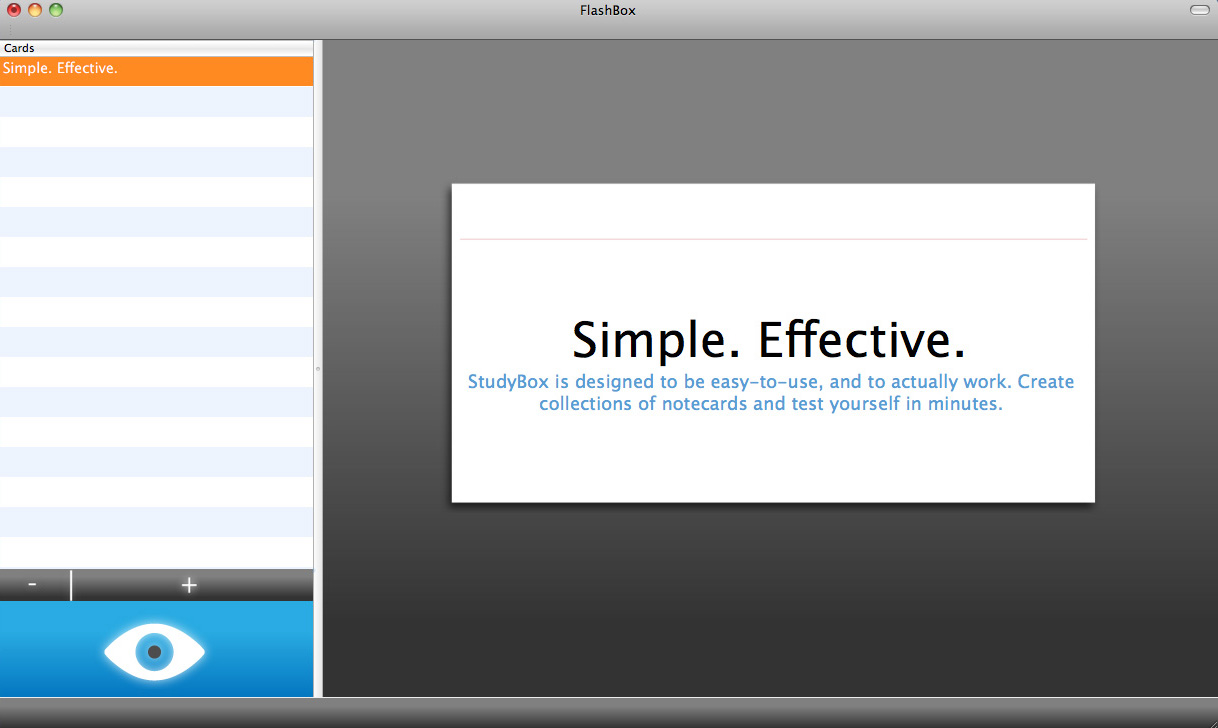
A screenshot shows the interface of the FlashBox application, which helps users study flashcards on their computers. The program, which was developed in just two weeks, became the most downloaded Education app in March in the Mac App Store.
Courtesy of ZACHARY SPITULSKI
Like many young entrepreneurs, Zachary Spitulski began with a simple idea conceived in a college dorm room.
While sitting around his computer with a few friends during winter quarter, Spitulski, a second-year Design | Media Arts student, brainstormed an idea for a computer application that would let users create and view virtual flashcards on their computers, as well as allow them to sync their cards to their smart phones.
“Something like that would be hugely successful, especially at a university,” Spitulski said. “We looked it up, but there was nothing that had the same functions we were talking about.”
From this simple idea, Spitulski began developing FlashBox, which launched in the Mac App Store in March. Sold in 90 countries, FlashBox was the most downloaded Education app in March and can currently be purchased for $0.99.
The FlashBox app consists of a sidebar where users can add or remove flashcards and a main screen where they can edit or view their cards. The app also includes the option to turn the definition on or off. The cards are easily organized and can also be shared with others.
Spitulski’s goal in developing FlashBox was to create an app with a minimalist interface that was easy to use, he said.
Since FlashBox’s release, Spitulski has already updated the app to include new languages such as German, Spanish, French and Italian. By the end of this week, he plans to release another update with new features, including the ability to shuffle the flashcards, add images and edit font sizes and styles. The goal is to produce a product that grabs people’s attention, Spitulski said.
“I want it to be something that’s universally useful, not just for college students, but for junior high or high school students too,” he said.
For students who use note cards as a study tool, FlashBox can help them cut down on the time spent copying definitions, said Michael Brown, a first-year political science student and a friend of Spitulski’s.
“A lot of the times if you find material on the Internet, you can just copy-paste what you want into FlashBox,” Brown said. “In the end, you finish making your flashcards faster so you have more time to study them.”
Spitulski began thinking about creating an app after taking DESMA 28, a class on interactivity. The course focused on creating meaningful activity through web design and programming, said Michael Kontopoulos, a lecturer of Design | Media Arts.
“Design | Media Arts courses are very production-oriented,” Kontopoulos said. “Our class was very based on having the students develop their own interests and learning good methods for executing on them.”
Though Spitulski had never studied computer programming before, after learning a coding language called Processing in the class, he wanted to use his skills to develop a complete application outside of class.
“I love web design, I love the user experience, and all that combined made me want to make something that would put everything together and that I could sell,” Spitulski said.
The biggest hurdle was finding a starting point for executing his idea, he said.
Since Mac App Store apps are written in another programming language called Objective-C, Spitulski ordered books from Amazon.com to learn the language on his own.
The first version of FlashBox was written and submitted to the Mac App Store in two weeks. In developing the app, he incorporated concepts that he learned in his classes about web design and the user experience, as well as material from books and online forums.
“It was a lot of really late nights,” Spitulski said. “I probably put in a couple hundred hours working on the first release.”
Feedback from the people around him also proved to be influential in FlashBox’s development, Spitulski said.
Though FlashBox has only been in the Mac App Store for less than a month, it has already turned into a business that is helping Spitulski pay for room and board in the dorms.
“I didn’t plan on making much at all,” Spitulski said. “I just wanted something that I could put in my portfolio, but it’s exceeded expectations, and it’s actually growing every day.”
Spitulski’s success is due in part to his ability to execute and follow through on his ideas, said Ari Baron, Spitulski’s manager in the Associated Students UCLA marketing department.
“I feel like there’s a lot of ideas out there, but there’s few people that will take the action and actually follow through, and that’s a big part of it,” Baron said. “Zach definitely has that.”
Spitulski will continue expanding FlashBox and has already hired a friend from high school to help him with the programming for future FlashBox releases, which will include the ability to sync FlashBox across iPhone, iPod touch and iPad.
However, FlashBox is just the beginning, as he plans to take the money he’s earning and reinvest it to make more applications, Spitulski said.
“I’m in the process of filing for a business license,” Spitulski said. “The plan is to create more apps, but the focus is on quality.”
